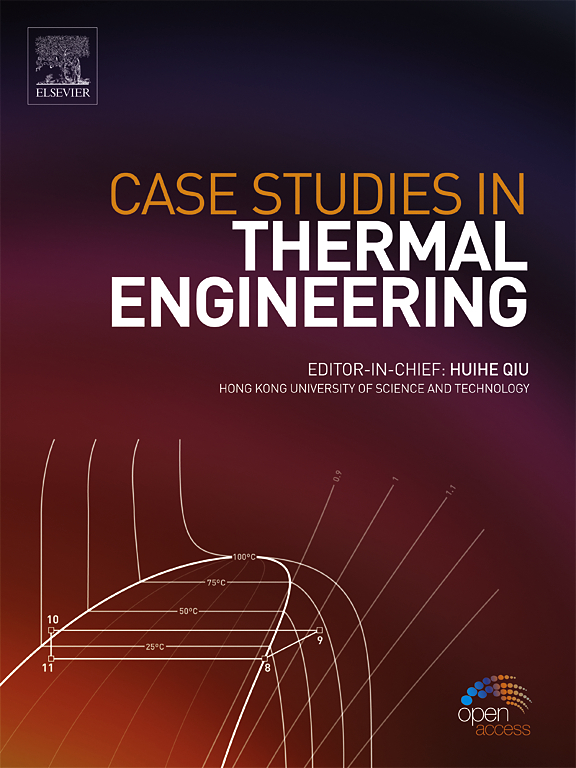Techno-economic analysis of a hybrid thermal desalination system integrated with a PVT collector
IF 6.4
2区 工程技术
Q1 THERMODYNAMICS
引用次数: 0
Abstract
Sustainable societies will require innovative technical solutions to fulfil the mounting demand for water and energy to support urban lifestyles. Meeting the challenges of the water-energy nexus requires the implementation of sustainable technologies such as photovoltaics, solar desalination, and their integrated solutions, to meet a growing demand. The novelty of the present work is to utilizing the waste heat in proposed photovoltaic thermal (PVT) based hybrid desalination system with a step-wise solar still (SSS) and humidification-dehumidification (HD) desalination is being studied with an emphasis on life cycle assessment and techno-economic analysis of the proposed configuration. Life cycle studies reveal that the average energy production factor (EPF) is 14.84, the average life cycle conversion efficiency (LCCE) is 72.82 % over a 25-year life span, and the energy payback time (EPBT) is about 1.9 years on an energy basis with an average thermal efficiency of 77.72 %. The significance of hybrid systems for sustainable development has been highlighted, along with the possibility of 4.53 tons of CO2 reduction and 389.58 USD in carbon credits that can be obtained annually for a typical solar radiation of 610 W/m2 by deploying this hybrid system.
结合PVT集热器的混合热脱盐系统技术经济分析
可持续社会将需要创新的技术解决方案来满足日益增长的水和能源需求,以支持城市生活方式。为了应对水-能源关系的挑战,需要实施可持续技术,如光伏发电、太阳能脱盐及其综合解决方案,以满足日益增长的需求。目前研究的新颖之处在于将废热利用在基于光伏热(PVT)的混合海水淡化系统中,该系统具有分步式太阳能蒸馏器(SSS)和加湿-除湿(HD)海水淡化,重点是对所建议配置的生命周期评估和技术经济分析。生命周期研究表明,25年寿命的平均能量生产因子(EPF)为14.84,平均生命周期转换效率(LCCE)为72.82%,能量回收期(EPBT)约为1.9年,平均热效率为77.72%。混合动力系统对可持续发展的重要性得到了强调,同时,通过部署这种混合动力系统,每年可以减少4.53吨二氧化碳排放,并获得389.58美元的碳信用额度,而典型的太阳辐射为610 W/m2。
本文章由计算机程序翻译,如有差异,请以英文原文为准。
求助全文
约1分钟内获得全文
求助全文
来源期刊

Case Studies in Thermal Engineering
Chemical Engineering-Fluid Flow and Transfer Processes
CiteScore
8.60
自引率
11.80%
发文量
812
审稿时长
76 days
期刊介绍:
Case Studies in Thermal Engineering provides a forum for the rapid publication of short, structured Case Studies in Thermal Engineering and related Short Communications. It provides an essential compendium of case studies for researchers and practitioners in the field of thermal engineering and others who are interested in aspects of thermal engineering cases that could affect other engineering processes. The journal not only publishes new and novel case studies, but also provides a forum for the publication of high quality descriptions of classic thermal engineering problems. The scope of the journal includes case studies of thermal engineering problems in components, devices and systems using existing experimental and numerical techniques in the areas of mechanical, aerospace, chemical, medical, thermal management for electronics, heat exchangers, regeneration, solar thermal energy, thermal storage, building energy conservation, and power generation. Case studies of thermal problems in other areas will also be considered.
 求助内容:
求助内容: 应助结果提醒方式:
应助结果提醒方式:


